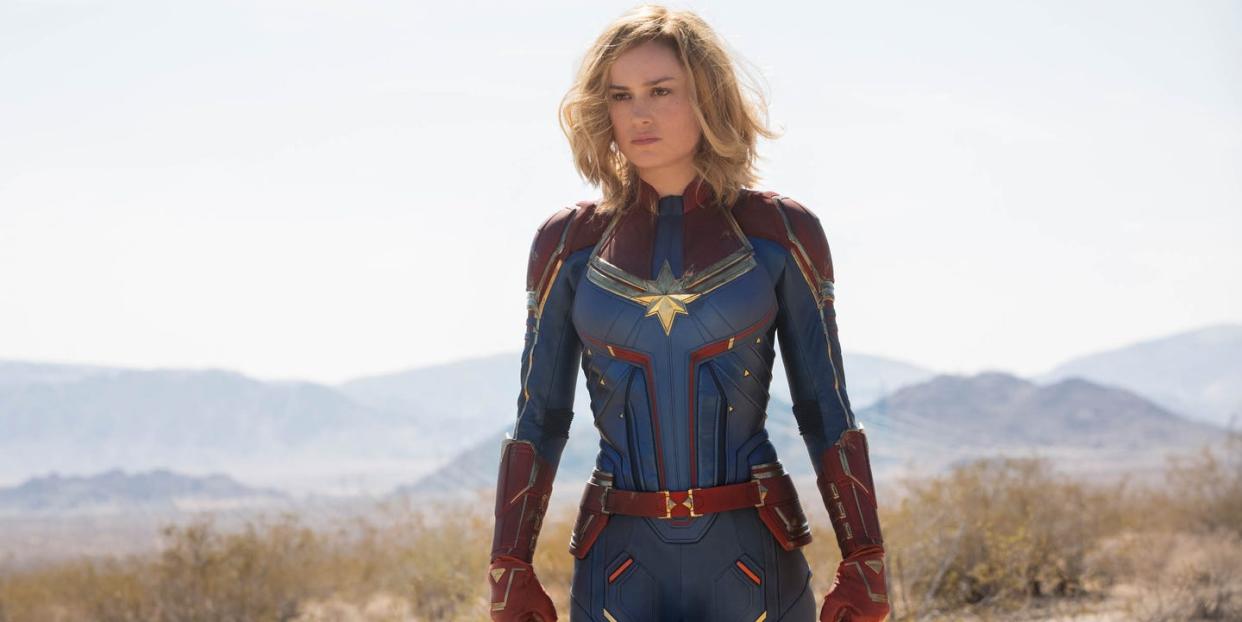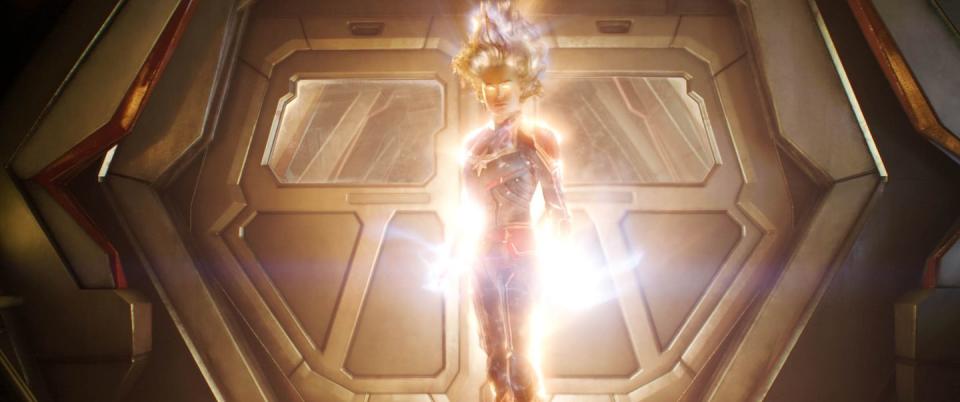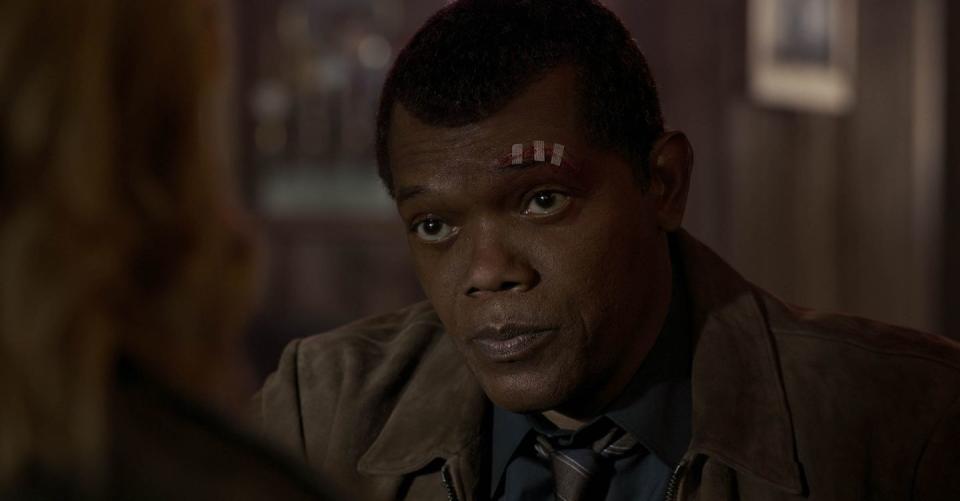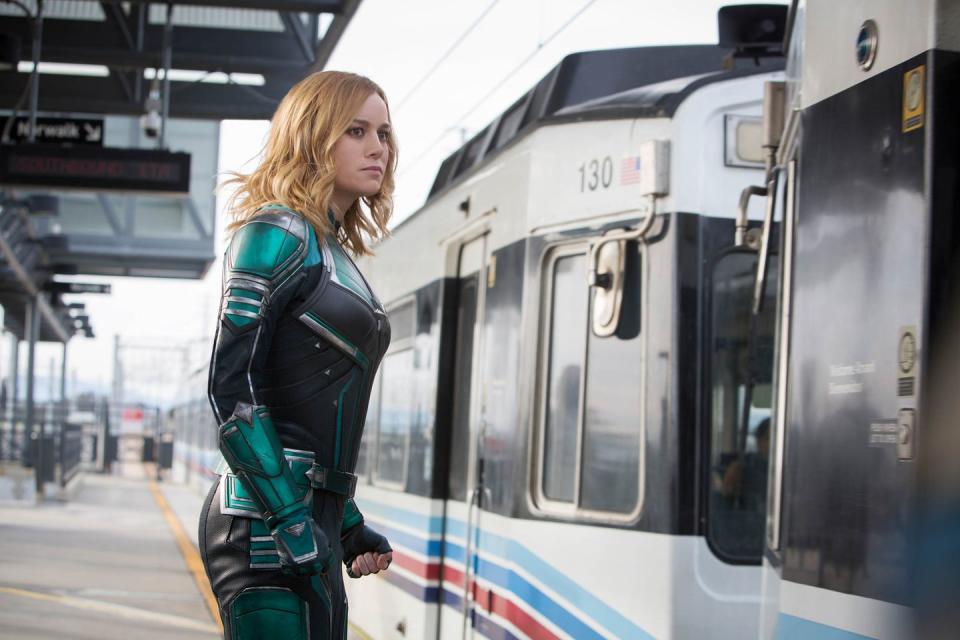'Captain Marvel' Succeeds In Rewriting Its Own History

Warning: Spoilers for Captain Marvel ahead.
When Captain Marvel first appeared in Marvel Super-Heroes #12 in December of 1967, the character was a blonde dude named Mar-Vell whose name humans mispronounced (turning the two words into one, "Marvel"). In those early years, Mar-Vell was an alien Kree soldier sent to Earth to keep tabs on humans. On Earth, he takes the alter ego of Walter Lawson and (in Marvel's Super-heroes no. 13, published in 1968) befriends a woman named Carol Danvers, a U.S. Air Force officer at a top secret military research facility. Her introduction is pretty bad, by today's standards, established as a love interest of Mar-Vell's to be objectified by the men within the pages.
Here's the TL;DR version of what happens next: During an explosion of a Kree device, Danvers is saved by Captain Marvel, whose DNA fuses with hers, turning her into a half-Kree woman with incredible powers. In the '70s she reappears as Ms. Marvel, a character, who finally had her own leading series in 1977. From there, Ms. Marvel had some extremely good and extremely bad storylines, ranging from surprisingly progressive for the time to completely unforgivable by any decade's standards.

It's not until 2012 that Danvers takes on the mantle of Captain Marvel in Kelly Sue DeConnick's comics and becomes an ally of some of the Avengers during the famed Civil War series in 2016.
So, in other words, the Captain Marvel we've seen in trailers and posters and teasers played by Brie Larson is a relatively new concept. And despite 50 years of rocky history, the best thing Marvel was able to do in its first film of the modern era starring a female character is rewrite its own history.
The events of Captain Marvel are loosely based partially on the Kree-Skrull war from the comics and partially on DeConnick's version of the character. This involves an intergalactic war between two alien races: the Kree, which include Mar-Vell, and the Skrull, their shape shifting adversaries. Larson's Carol Danvers is a Kree warrior with amnesia being trained by Yon-Rogg, a military commander played by Jude Law.

Now, going into this film, Marvel did an interesting thing. The actual character names and plot were kept entirely under wraps. Fans debated if Law would be playing Mar-Vell or Yon-Rogg. As the trailers so clearly laid out, this was a film about the Good Guys (Kree) fighting the Bad Guys (Skrull). A simple good-versus-evil plot, and a sound basis for a superhero comic informed by decades of comic book material.
But what Marvel did with its source material is entirely twist it into a narrative fans deserve in 2019-and a more responsible plot for its first movie starring a female hero. Instead, Captain Marvel is a film that fans didn't expect. As we learn in the film, an extremely extra Annette Bening is Carol Danvers's mentor Mar-Vell. Instead of getting her powers from a man who saves her, Danvers gets her powers through her own bravery-protecting Mar-Vell after a crashed test flight. This is all revealed throughout in a Memento-type amnesiac scenario.
Meanwhile, Captain Marvel also redefines the clear cut nature of its storied Kree-Skrull war. As we learn in the film, good and evil isn't exactly what it seems. War on either side has shades of grey, and good and evil is a matter of perspective. The Kree aren't exactly the noble warrior heroes they consider themselves to be-and the Skrull aren't exactly a horrible scourge of the galaxy.
It's this definition of identity that permeates throughout Captain Marvel and changes even literally with the shape-shifting Skrull. Captain Marvel redefines what a hero can be, what a hero can look like and accomplish, while she searches to explain her own identity. Marvel is re-writing decades of history, changing the identity of some of its best-known names to put women in command of their own narrative. Even the ugly green Skrull are overcoming decades of being considered a race of space villains.
This is clever writing that not only challenges comic book fans, but positions Captain Marvel as the all-powerful Superman-type of the Marvel Cinematic Universe. And while Marvel manages to pull off this glorious re-visualization of an iconic character, I just wish they were able to pull off a movie that would have better stood on its own.
Captain Marvel is a complex movie that re-imagines a complex history of comics. It also backs itself into an origin story-as Marvel did with Spider-Man: Homecoming-while laying groundwork for Captain Marvel to be the savior of the upcoming Avengers: Endgame. That's a lot of moving parts for one movie. Compare that to last year's Black Panther, which also had to introduce a new title character while setting up for Avengers: Infinity War. But where Black Panther succeeded as functioning as a stand-alone film, Captain Marvel fails. At every turn, Captain Marvel is so focused on what came before it and what will come after that the film is hard to follow. It requires immense pre-requisite knowledge of previous films and even a general understanding of comic book concepts that will likely leave casual moviegoers confused.

Which is a shame, because Captain Marvel does manage to pull off an unconventional origin story in introducing Larson's Danvers. Her backstory is revealed in a beautiful moments of flashbacks showing her character's unrelenting strength at various stages in her life. This is the montage of Danvers getting back up after falling down, which is one of Marvel's most stunning visual storytelling moments. Despite her amnesia, Danvers's sarcasm and confidence still manages to shine through the gaps in her memory. She's an unrelenting hero, one who manages to remain steadfast in herself even though she can't remember the events that made her this way. It's kind of like a nature vs. nurture thing; even though she doesn't have the memories that informed who she is, Danvers still remains that person. And Larson plays her as if she's trying to piece together that past on her own-her personality is there, just hidden behind her own mental fog. This might be a polarizing portrayal for some audiences who might feel like Larson is holding back. But, for me, since Larson is such an incredible actress, I gave her the benefit of the doubt and chalked this up to her character's forgotten past.
In the movie's best moments, her dynamic with a digitally de-aged Samuel L. Jackson is fantastic, with Larson consistently clapping back at the uncrackable confidence of Nick Fury. In scenes with Larson, Jackson and the very good kitty named Goose are the stuff of nerd meme greatness. It's also worth noting that unlike almost all other superhero movies in the MCU, Larson's character is not defined by a romantic relationship with a man. Instead, her life back in her forgotten past was anchored by a friendship with Lashana Lynch's Maria Rambeau.
With all of these elements, it's unfortunate that Captain Marvel does struggle to break out of the greater MCU. But what counts is that this is a story that manages to re-write the established canon of Marvel history that provides something fresh and new. They pulled off a movie that Marvel fans-a group obsessed with sniffing out spoilers-weren't expecting. But unfortunately, that was only the start. At least we'll get more of Captain Marvel to save the Avengers in Endgame next month.
('You Might Also Like',)

